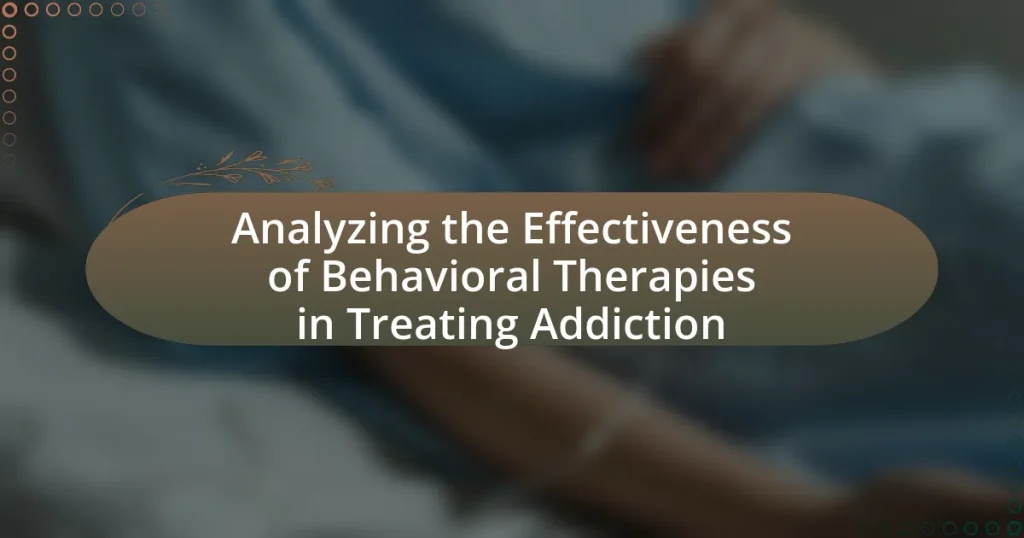Behavioral therapies are structured approaches aimed at modifying harmful behaviors associated with substance use disorders, with techniques such as Cognitive Behavioral Therapy (CBT) and Contingency Management being prominent examples. These therapies focus on changing negative thought patterns and behaviors, leading to improved treatment outcomes, as evidenced by various studies. Key principles include reinforcement, conditioning, and behavior modification, which address the psychological aspects of addiction. The article also explores the effectiveness of different behavioral therapies, factors influencing their success, and the importance of integrating these therapies into comprehensive treatment plans, highlighting the role of support systems and ongoing engagement in maintaining recovery.

What are Behavioral Therapies in the Context of Addiction Treatment?
Behavioral therapies in the context of addiction treatment are structured approaches that aim to modify harmful behaviors associated with substance use disorders. These therapies, such as Cognitive Behavioral Therapy (CBT) and Contingency Management, focus on identifying and changing negative thought patterns and behaviors that contribute to addiction. Research indicates that behavioral therapies can significantly improve treatment outcomes; for instance, a study published in the Journal of Substance Abuse Treatment found that CBT effectively reduces substance use and enhances coping strategies in individuals with addiction.
How do Behavioral Therapies differ from other treatment modalities?
Behavioral therapies differ from other treatment modalities primarily in their focus on modifying specific behaviors and thought patterns associated with addiction. Unlike pharmacological treatments that rely on medication to alleviate symptoms, behavioral therapies employ techniques such as cognitive-behavioral therapy (CBT) and contingency management to directly address the underlying behaviors that contribute to addiction. Research indicates that behavioral therapies can lead to significant improvements in treatment outcomes; for instance, a meta-analysis published in the Journal of Substance Abuse Treatment found that CBT is effective in reducing substance use and improving psychosocial functioning in individuals with addiction. This evidence underscores the unique approach of behavioral therapies in actively engaging patients in their recovery process through skill-building and behavior modification.
What are the key principles underlying Behavioral Therapies?
The key principles underlying Behavioral Therapies include the concepts of reinforcement, conditioning, and behavior modification. Reinforcement involves using rewards or consequences to increase or decrease specific behaviors, which is foundational in shaping behavior. Conditioning refers to the process of associating certain stimuli with specific responses, as seen in classical and operant conditioning, which helps individuals learn new behaviors or unlearn maladaptive ones. Behavior modification focuses on systematically changing behavior through techniques such as exposure therapy, cognitive restructuring, and skills training, which are effective in addressing addiction by promoting healthier coping mechanisms. These principles are supported by extensive research, including studies that demonstrate the efficacy of behavioral interventions in reducing substance use and improving treatment outcomes.
How do Behavioral Therapies address the psychological aspects of addiction?
Behavioral therapies address the psychological aspects of addiction by modifying maladaptive behaviors and thought patterns associated with substance use. These therapies, such as Cognitive Behavioral Therapy (CBT) and Contingency Management, focus on identifying triggers, developing coping strategies, and reinforcing positive behaviors. Research indicates that CBT can significantly reduce substance use by helping individuals understand the relationship between their thoughts, feelings, and behaviors, thereby promoting healthier decision-making. A study published in the Journal of Substance Abuse Treatment found that individuals receiving CBT showed a 30% greater reduction in substance use compared to those who did not receive this therapy. This evidence supports the effectiveness of behavioral therapies in addressing the psychological components of addiction.
What types of Behavioral Therapies are commonly used for addiction?
Cognitive Behavioral Therapy (CBT), Contingency Management, Motivational Interviewing, and Dialectical Behavior Therapy (DBT) are commonly used behavioral therapies for addiction. CBT focuses on identifying and changing negative thought patterns and behaviors associated with substance use. Contingency Management reinforces positive behaviors through rewards, effectively encouraging abstinence. Motivational Interviewing enhances an individual’s motivation to change by exploring and resolving ambivalence. DBT, originally developed for borderline personality disorder, has been adapted for addiction treatment by emphasizing emotional regulation and interpersonal effectiveness. These therapies have been validated through numerous studies demonstrating their efficacy in reducing substance use and improving treatment outcomes.
What is Cognitive Behavioral Therapy (CBT) and how is it applied?
Cognitive Behavioral Therapy (CBT) is a structured, time-limited psychotherapeutic approach that focuses on identifying and changing negative thought patterns and behaviors. CBT is applied in treating addiction by helping individuals recognize the triggers and thoughts that lead to substance use, teaching coping strategies, and promoting healthier behaviors. Research indicates that CBT can significantly reduce substance use and improve treatment outcomes, as evidenced by a meta-analysis published in the Journal of Substance Abuse Treatment, which found that CBT is effective in decreasing drug use and enhancing recovery rates among individuals with addiction.
How does Dialectical Behavior Therapy (DBT) contribute to addiction recovery?
Dialectical Behavior Therapy (DBT) contributes to addiction recovery by providing individuals with skills to manage emotions, improve interpersonal relationships, and reduce self-destructive behaviors. DBT focuses on teaching mindfulness, distress tolerance, emotional regulation, and interpersonal effectiveness, which are crucial for individuals struggling with addiction. Research indicates that DBT can significantly reduce substance use and improve overall psychological functioning, as evidenced by a study published in the Journal of Substance Abuse Treatment, which found that participants receiving DBT showed a 50% reduction in substance use compared to those receiving standard treatment. This structured approach helps individuals develop coping mechanisms that are essential for maintaining sobriety and preventing relapse.
What evidence supports the effectiveness of Behavioral Therapies in treating addiction?
Behavioral therapies are effective in treating addiction, as evidenced by numerous studies demonstrating significant reductions in substance use and improvements in psychosocial functioning. For instance, a meta-analysis published in the journal “Psychological Bulletin” by Hofmann et al. (2012) found that cognitive-behavioral therapy (CBT) significantly reduced substance use in individuals with addiction disorders. Additionally, the National Institute on Drug Abuse (NIDA) reports that contingency management, a behavioral therapy approach, has shown to increase treatment retention and reduce drug use among patients. These findings underscore the efficacy of behavioral therapies in addressing addiction through structured interventions that modify behavior and thought patterns.
What are the results of recent studies on Behavioral Therapies?
Recent studies on Behavioral Therapies indicate significant effectiveness in treating addiction, with many demonstrating improved outcomes for individuals. For instance, a meta-analysis published in the journal “Psychological Bulletin” by Hofmann et al. (2012) found that cognitive-behavioral therapy (CBT) significantly reduced substance use and improved psychosocial functioning in patients. Additionally, a study in “Addiction” by McHugh et al. (2013) highlighted that contingency management, a behavioral therapy approach, led to higher rates of abstinence in individuals with substance use disorders. These findings collectively underscore the efficacy of Behavioral Therapies in addressing addiction-related challenges.
How do success rates compare between Behavioral Therapies and other treatments?
Success rates for Behavioral Therapies generally show comparable or superior outcomes when contrasted with other treatments for addiction. Research indicates that Cognitive Behavioral Therapy (CBT), a prominent form of Behavioral Therapy, has a success rate of approximately 50-60% in achieving abstinence or significant reduction in substance use, which is similar to or better than pharmacological treatments that often range from 30-50% effectiveness. A meta-analysis published in the Journal of Substance Abuse Treatment found that patients receiving Behavioral Therapies had a higher likelihood of maintaining long-term recovery compared to those undergoing only medication-assisted treatments. This evidence supports the assertion that Behavioral Therapies can be as effective, if not more so, than other treatment modalities in addressing addiction.

What factors influence the effectiveness of Behavioral Therapies in addiction treatment?
The effectiveness of Behavioral Therapies in addiction treatment is influenced by several key factors, including the therapeutic alliance, individual motivation, treatment duration, and the presence of co-occurring mental health disorders. Research indicates that a strong therapeutic alliance between the therapist and the client enhances engagement and adherence to treatment, which is crucial for positive outcomes. Additionally, individual motivation plays a significant role; higher motivation levels correlate with better treatment responses. Treatment duration also impacts effectiveness, as longer interventions tend to yield more substantial results. Furthermore, the presence of co-occurring mental health disorders can complicate treatment and may require integrated approaches to address both addiction and mental health issues effectively. These factors collectively shape the success of Behavioral Therapies in addiction treatment.
How does the individual’s background affect therapy outcomes?
An individual’s background significantly affects therapy outcomes by influencing their beliefs, motivations, and engagement in the therapeutic process. Factors such as socioeconomic status, cultural background, education level, and previous experiences with mental health services shape how individuals perceive therapy and their willingness to participate actively. Research indicates that individuals from marginalized communities may face barriers such as stigma and lack of access to resources, which can hinder their treatment engagement and success rates. For instance, a study published in the Journal of Substance Abuse Treatment found that clients with higher socioeconomic status reported better therapy outcomes due to increased access to support systems and resources. Thus, understanding an individual’s background is crucial for tailoring therapeutic approaches to enhance effectiveness in treating addiction.
What role do co-occurring mental health disorders play in treatment effectiveness?
Co-occurring mental health disorders significantly impact treatment effectiveness by complicating the therapeutic process and outcomes. When individuals experience both addiction and mental health issues, such as depression or anxiety, the likelihood of treatment failure increases due to the interplay of symptoms that can exacerbate each other. Research indicates that integrated treatment approaches, which address both addiction and mental health disorders simultaneously, lead to better outcomes compared to sequential treatment. For instance, a study published in the Journal of Substance Abuse Treatment found that patients receiving integrated care showed a 30% higher retention rate in treatment and improved overall functioning compared to those receiving standard care. This evidence underscores the necessity of addressing co-occurring disorders to enhance the effectiveness of behavioral therapies in treating addiction.
How does the duration and intensity of therapy impact results?
The duration and intensity of therapy significantly impact treatment outcomes in addiction recovery. Longer therapy durations typically allow for deeper exploration of underlying issues and more comprehensive skill development, leading to better long-term results. For instance, a meta-analysis published in the Journal of Substance Abuse Treatment found that individuals who engaged in therapy for at least 12 weeks showed higher rates of abstinence compared to those who participated in shorter programs. Additionally, higher intensity therapies, characterized by more frequent sessions and greater therapeutic engagement, have been associated with improved retention rates and reduced relapse occurrences, as evidenced by research from the National Institute on Drug Abuse. Thus, both extended duration and increased intensity are crucial factors that enhance the effectiveness of behavioral therapies in treating addiction.
What are the challenges faced in implementing Behavioral Therapies?
The challenges faced in implementing Behavioral Therapies include a lack of trained professionals, variability in treatment fidelity, and patient engagement issues. The shortage of qualified therapists limits access to effective treatment, as evidenced by a report from the Substance Abuse and Mental Health Services Administration, which highlights that many regions lack sufficient mental health providers. Variability in treatment fidelity occurs when therapists do not adhere strictly to established protocols, which can dilute the effectiveness of the therapy. Additionally, patient engagement issues arise when individuals are not motivated or willing to participate fully in the therapeutic process, leading to lower success rates. These factors collectively hinder the successful implementation of Behavioral Therapies in addiction treatment.
What barriers do patients encounter when accessing these therapies?
Patients encounter several barriers when accessing behavioral therapies for addiction, including financial constraints, lack of insurance coverage, and limited availability of qualified providers. Financial constraints often prevent patients from affording therapy sessions, as many behavioral therapies can be costly and not all insurance plans cover them. Additionally, a study published in the Journal of Substance Abuse Treatment found that only 10% of addiction treatment facilities offer comprehensive behavioral therapy, leading to limited access for patients seeking help. Furthermore, stigma surrounding addiction can deter individuals from seeking treatment, as they may fear judgment or discrimination. These barriers collectively hinder patients’ ability to access necessary therapies for effective addiction treatment.
How can therapists overcome resistance to treatment?
Therapists can overcome resistance to treatment by establishing a strong therapeutic alliance and employing motivational interviewing techniques. A strong therapeutic alliance fosters trust and collaboration, which can reduce defensiveness and enhance engagement. Motivational interviewing, a client-centered approach, helps clients explore their ambivalence towards change, thereby increasing their motivation to participate in treatment. Research indicates that clients who feel understood and supported are more likely to adhere to treatment plans, as evidenced by a study published in the Journal of Substance Abuse Treatment, which found that motivational interviewing significantly improved treatment outcomes in individuals with substance use disorders.

How can Behavioral Therapies be integrated into a comprehensive addiction treatment plan?
Behavioral therapies can be integrated into a comprehensive addiction treatment plan by employing evidence-based techniques that address both the psychological and behavioral aspects of addiction. These therapies, such as Cognitive Behavioral Therapy (CBT) and Motivational Interviewing (MI), can be utilized to help individuals identify triggers, develop coping strategies, and modify harmful behaviors associated with substance use.
Research indicates that integrating behavioral therapies with pharmacological treatments enhances overall treatment efficacy; for instance, a study published in the Journal of Substance Abuse Treatment found that patients receiving both CBT and medication for opioid dependence showed significantly better outcomes than those receiving medication alone. This integration allows for a holistic approach, addressing the multifaceted nature of addiction and improving long-term recovery rates.
What role do support systems play in enhancing therapy effectiveness?
Support systems significantly enhance therapy effectiveness by providing emotional, social, and practical support to individuals undergoing treatment. Research indicates that individuals with strong support systems are more likely to adhere to therapy, experience reduced relapse rates, and achieve better overall outcomes. For instance, a study published in the Journal of Substance Abuse Treatment found that patients with supportive family and friends reported higher levels of motivation and engagement in their treatment programs, leading to improved recovery rates. This evidence underscores the critical role that support systems play in facilitating positive therapeutic outcomes in addiction treatment.
How can family involvement improve treatment outcomes?
Family involvement can significantly improve treatment outcomes by enhancing support systems and fostering accountability among individuals undergoing addiction treatment. Research indicates that when family members participate in therapy sessions, it leads to increased engagement and motivation for the individual in recovery. A study published in the Journal of Substance Abuse Treatment found that family involvement in treatment programs resulted in a 20% higher success rate in maintaining sobriety compared to those who did not have family support. This improvement is attributed to the emotional and practical support families provide, which can help mitigate stressors that contribute to relapse.
What are the benefits of combining Behavioral Therapies with pharmacological treatments?
Combining Behavioral Therapies with pharmacological treatments enhances treatment outcomes for addiction by addressing both psychological and physiological aspects of the disorder. This integrated approach allows for more comprehensive care, as behavioral therapies help individuals develop coping strategies and modify harmful behaviors, while pharmacological treatments can alleviate withdrawal symptoms and reduce cravings. Research indicates that such combinations can lead to higher retention rates in treatment programs and improved overall recovery outcomes, as evidenced by studies showing that patients receiving both types of treatment report lower relapse rates compared to those receiving only one form of intervention.
What best practices should be followed when using Behavioral Therapies for addiction?
Best practices for using Behavioral Therapies for addiction include tailoring the therapy to individual needs, employing evidence-based techniques, and ensuring ongoing support and follow-up. Tailoring therapy to individual needs enhances engagement and effectiveness, as different individuals may respond differently to various approaches. Evidence-based techniques, such as Cognitive Behavioral Therapy (CBT) and Motivational Interviewing, have been shown to significantly improve treatment outcomes, with studies indicating that CBT can reduce substance use by up to 50%. Ongoing support and follow-up are crucial, as they help maintain progress and prevent relapse, with research showing that continuous engagement in therapy can lead to better long-term recovery rates.
How can therapists tailor approaches to meet individual needs?
Therapists can tailor approaches to meet individual needs by conducting thorough assessments to understand each client’s unique circumstances, preferences, and challenges. This individualized assessment allows therapists to select and adapt therapeutic techniques that align with the client’s specific behavioral patterns and motivations. For instance, cognitive-behavioral therapy (CBT) can be modified to address the particular triggers and coping strategies relevant to the client’s addiction, enhancing the effectiveness of treatment. Research indicates that personalized treatment plans significantly improve outcomes, as evidenced by a study published in the Journal of Substance Abuse Treatment, which found that clients receiving tailored interventions showed a 30% higher success rate in maintaining sobriety compared to those on standardized treatment protocols.
What ongoing support is essential for maintaining recovery post-therapy?
Ongoing support essential for maintaining recovery post-therapy includes participation in support groups, regular follow-up sessions with therapists, and engagement in community resources. Support groups, such as Alcoholics Anonymous or Narcotics Anonymous, provide a network of individuals who share similar experiences, fostering accountability and encouragement. Regular follow-up sessions with therapists help individuals address challenges and reinforce coping strategies learned during therapy. Community resources, including educational workshops and recreational activities, promote social engagement and skill development, which are crucial for sustaining recovery. Research indicates that individuals who actively participate in these support systems have higher rates of long-term recovery success, highlighting the importance of ongoing support in the recovery process.
What practical tips can enhance the effectiveness of Behavioral Therapies in treating addiction?
Practical tips to enhance the effectiveness of Behavioral Therapies in treating addiction include establishing a strong therapeutic alliance, utilizing evidence-based techniques, and incorporating personalized treatment plans. A strong therapeutic alliance fosters trust and engagement, which are critical for successful outcomes; studies show that a positive relationship between therapist and client significantly improves treatment adherence and effectiveness. Evidence-based techniques, such as Cognitive Behavioral Therapy (CBT) and Motivational Interviewing, have been proven to reduce substance use and promote recovery, as supported by research from the National Institute on Drug Abuse. Additionally, personalized treatment plans that consider individual circumstances, preferences, and co-occurring mental health issues lead to better engagement and outcomes, as highlighted in the Journal of Substance Abuse Treatment.
